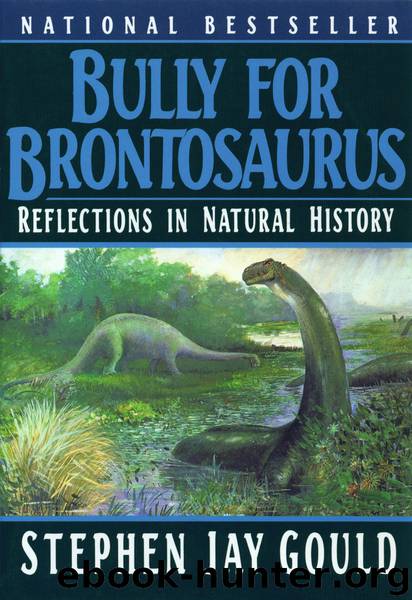Bully for Brontosaurus by Stephen Jay Gould

Author:Stephen Jay Gould
Language: eng
Format: epub, mobi
Publisher: W. W. Norton & Company, Inc.
Published: 1991-01-28T16:00:00+00:00
It was, of course, often done—but rarely said so boldly and without apology. In any case, Caldwell eventually found the eggs of the platypus (usually laid two at a time and easily overlooked at their small size of less than an inch in length).
Caldwell solved a specific mystery that had plagued zoology for nearly a century, but he only intensified the general problem. He had proved irrevocably that the platypus is a mélange, not available for unambiguous placement into any major group of vertebrates. Geoffroy had been right about the eggs; Meckel about the mammary glands.
The platypus has always suffered from false expectations based on human foibles. (This essay discusses the two stages of this false hoping, and then tries to rescue the poor platypus in its own terms.) During the half-century between its discovery and Darwin’s Origin of Species, the platypus endured endless attempts to deny or mitigate its true mélange of characters associated with different groups of vertebrates. Nature needed clean categories established by divine wisdom. An animal could not both lay eggs and feed its young with milk from mammary glands. So Geoffroy insisted upon eggs and no milk; Meckel upon milk and live birth.
Caldwell’s discovery coincided with the twenty-fifth anniversary of Darwin’s Origin. By this time, evolution had made the idea of intermediacy (and mélanges of characters) acceptable, if not positively intriguing. Yet, freed of one burden, the platypus assumed another—this time imposed by evolution, the very idea that had just liberated this poor creature from uncongenial shoving into rigid categories. The platypus, in short, shouldered (with its interclavicle bone) the burden of primitiveness. It would be a mammal, to be sure—but an amoeba among the gods; a tawdry, pitiable little fellow weighted down with the reptilian mark of Cain.
Caldwell dispatched his epitome a century ago, but the platypus has never escaped. I have spent the last week as a nearly full-time reader of platypusology. With a few welcome exceptions (mostly among Australian biologists who know the creature intimately), nearly every article identifies something central about the platypus as undeveloped or inefficient relative to placental mammals—as if the undoubted presence of premammalian characters condemns each feature of the platypus to an unfinished, blundering state.
Before I refute the myth of primitiveness for the platypus in particular, I should discuss the general fallacy that equates early with inefficient and still underlies so much of our failure to understand evolution properly. The theme has circulated through these essays for years—ladders and bushes. But I try to provide a new twist here—the basic distinction between early branching and undeveloped, or inefficient, sturcture.
If evolution were a ladder toward progress, with reptiles on a rung below mammals, then I suppose that eggs and an interclavicle would identify platypuses as intrinsically wanting. But the Old Testament author of Proverbs, though speaking of wisdom rather than evolution, provided the proper metaphor, etz chayim: She is a tree of life to them who take hold upon her. Evolution proceeds by branching, and not (usually) by wholesale transformation and replacement.
Download
This site does not store any files on its server. We only index and link to content provided by other sites. Please contact the content providers to delete copyright contents if any and email us, we'll remove relevant links or contents immediately.
The Lonely City by Olivia Laing(4782)
Animal Frequency by Melissa Alvarez(4442)
All Creatures Great and Small by James Herriot(4293)
Walking by Henry David Thoreau(3937)
Exit West by Mohsin Hamid(3803)
Origin Story: A Big History of Everything by David Christian(3674)
COSMOS by Carl Sagan(3601)
How to Read Water: Clues and Patterns from Puddles to the Sea (Natural Navigation) by Tristan Gooley(3443)
Hedgerow by John Wright(3335)
How to Read Nature by Tristan Gooley(3311)
The Inner Life of Animals by Peter Wohlleben(3293)
How to Do Nothing by Jenny Odell(3284)
Project Animal Farm: An Accidental Journey into the Secret World of Farming and the Truth About Our Food by Sonia Faruqi(3205)
Origin Story by David Christian(3181)
Water by Ian Miller(3166)
A Forest Journey by John Perlin(3052)
The Plant Messiah by Carlos Magdalena(2910)
A Wilder Time by William E. Glassley(2841)
Forests: A Very Short Introduction by Jaboury Ghazoul(2822)
